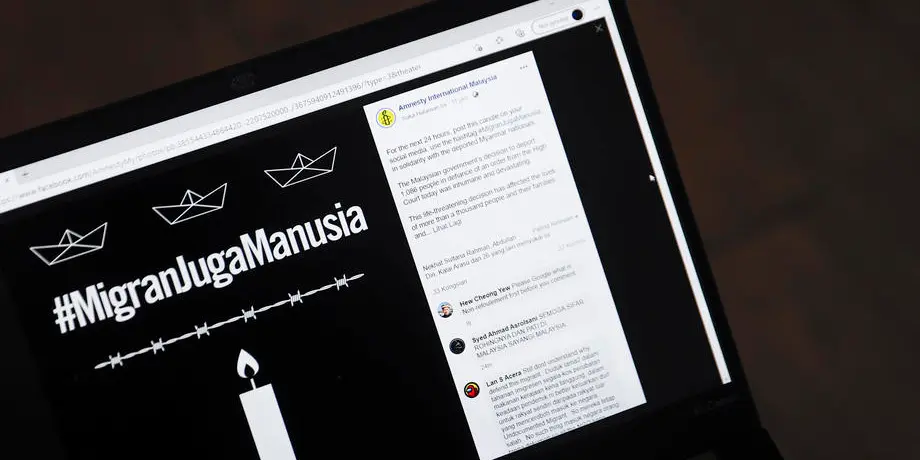
Malaysia Defies Court Order, Putting Lives in Imminent Danger
February 26, 2021

The Asia Pacific Refugee Rights Network (APRRN), Asian Forum for Human Rights and Development (FORUM-ASIA), ASEAN Parliamentarians for Human Rights (APHR) and the International Detention Coalition (IDC) strongly urge the Government of Malaysia to grant UNHCR immediate and unfettered access to immigration detention facilities. We further urge the government to investigate the deportation on 23 February 2021 of 1,086 individuals to Myanmar, in defiance of the Kuala Lumpur High Court’s interim stay order granted earlier that day.
On 22 February, Amnesty International Malaysia and Asylum Access Malaysia jointly filed an action in the Kuala Lumpur High Court to prevent the deportation of 1,200 persons to Myanmar. Several hours after the interim halt to deportation order was granted, the Malaysian government handed 1,086 individuals to Myanmar naval ships in flagrant violation of the court order. The next day, the High Court issued an extended stay order against the deportation of the remaining 114 individuals.
The Malaysian government has yet to provide information on the 114 persons or their whereabouts. Immigration officials asserted that the 1,086 deported did not include Rohingya refugees or asylum seekers. However, there is a substantial risk that the group includes refugees and asylum seekers, including unaccompanied children. According to Asylum Access and Amnesty International Malaysia, there were at least three UNHCR card holders and 17 children among those scheduled for deportation. APRRN also received troubling confirmation that at least two of those children was separated from their family and deported back to Myanmar alone.
The risk is also particularly acute given that UNHCR has been denied access to verify and assess individuals fleeing persecution since August 2019. Malaysia also lacks a domestic policy and legal framework for the identification and recognition of refugees in the country. In November 2020, the Human Rights Commission of Malaysia (SUHAKAM) estimated that there were approximately 1,000 refugees and people seeking asylum still in detention. The Ministry of Home Affairs confirmed that as of 26 October 2020, more than 756 minors are in immigration detention, with over 326 unaccompanied or separated children from Myanmar.
Returning individuals in need of international protection to Myanmar, especially children rendered unaccompanied through forcible separation from their parents or guardians, would amount to serious violation of Malaysia’s Child Act and Malaysia’s international obligations, notably the Convention on the Rights of the Child and the principle of non-refoulement.
Since the forceful seizure of power by the Myanmar military on 1 February 2021, Myanmar has seen the largest protest and uprising, calling for the restoration of democracy. Grave human rights abuses and tension have also risen steadily with hundreds of arbitrary arrests and detentions, deliberate internet disruption and disconnection from the outside world. With the escalating concerns over the rapid deterioration amidst a health crisis, “the use of deadly violence” by the military on innocent civilians, including the recent killing of a 14-year old was heavily condemned by the United Nations Secretary General in the 46th UN Human Rights Council session. World leaders, including G7 countries and neighbouring members of the Association of Southeast Asia Nations (ASEAN) continue expressing deep concern about the ongoing repression, horrifying loss of lives and the developments that would lead to serious regional instability. Malaysia was amongst the ASEAN countries which echoed that the political turmoil in Myanmar may affect security and stability in the region and is “one step backward in the process of democracy in that country”.
Ethnic minorities, many exiled in Malaysia, including amongst the 1,086 deported, have suffered atrocities for decades under the rule of the military. There is great fear that life for these ethnic minorities deported back to a military regime will likely worsen. Given the increasing instability and drastic shift in the political landscape in Myanmar, individuals who were previously not exposed to protection risks might now face severe security and safety threats.
We therefore call upon the Malaysian government to:
- Urgently grant UNHCR immediate and unrestricted access to the 114 individuals and all immigration detention facilities to verify the status of all detainees;
- Release individuals in need of international protection as identified by UNHCR who are still in detention, especially amongst the 114 who remained;
- Comply with the extended stay order issued by the Kuala Lumpur High Court on 24 February against the deportation of the remaining 114 who were part of the original 1,200 to be deported; and
- Open an independent and thorough investigation into the breach by the immigration department of the court order on 23 February, ensuring that those acting in violation of the court order are held fully accountable.
ASEAN Parliamentarians for Human Rights (APHR) was founded in June 2013 with the objective of promoting democracy and human rights across Southeast Asia. Our founding members include many of the region's most progressive Members of Parliament (MPs), with a proven track record of human rights advocacy work.